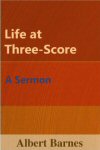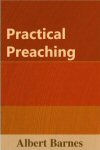The Sermons of Albert Barnes (7 vols.)
Digital Logos Edition
Overview
Albert Barnes is a well-known author respected around the world for his 26-volume Bible commentary series, Barnes’ Notes on the Old and New Testaments. His Notes were derived from his studying, teaching, and preaching experiences as a Presbyterian pastor. The Sermons of Albert Barnes collection presents many of his sermons and addresses, which were primarily about revival, salvation, and holy life.
Get more of this author’s works with Barnes’ Notes on the Old and New Testaments.

Key Features
- Showcases more than 80 sermons and addresses by Albert Barnes
- Presents Barnes’ focus on salvation and holy life throughout many of his messages
- Introduces Barnes’ personal thoughts beyond the scope of his Notes series
Product Details
- Title: The Sermons of Albert Barnes
- Author: Albert Barnes
- Volumes: 7
- Pages: 1,601
- Christian Group: Reformed
- Resource Type: Sermons
- Topic: Theology
Individual Titles
- Revival Sermons edited by A. Weston
- Practical Sermons: Designed for Vacant Congregations and Families by Albert Barnes
- The Theory and Desirableness of Revivals, Being Six Sermons by Albert Barnes
- Life at Three-Score: A Sermon by Albert Barnes
- Thanksgiving Sermon: The Virtues and Public Services of William Penn by Albert Barnes
- The Way of Salvation: Illustrated in a Series of Discourses by Albert Barnes
- Practical Preaching by Albert Barnes
This title is included in the following collections
You can save when you purchase this product as part of a collection.
Sermon Finder Collection (378 ...
$5,467.14$2,199.99Sermon Finder Collection (645 ...
$9,780.96$5,867.99

This volume contains 19 sermon discourses by Albert Barnes that are rich in matter, striking in illustration, beautiful in style, and powerful in appeal. Editor A. Weston designed this volume for both ministers and laymen. Some sermons included are “The Place and Importance of the Individual” based on 1 Corinthians 12:20–21, “Development of the Christian Character” based on Matthew 5:14–16, and “The Uses and Lessons of Disappointments” based on Job 6:15–20.
A. Weston is the author of Pulpit Aids and the editor of Hannam’s Pulpit Assistant.

These 23 sermon discourses by Albert Barnes were selected for their practical character. They are intended to impress the importance and necessity of personal religion and to urge the necessity of a holy life as the first great duty of man. Some sermons included are “The Deceitfulness of the Heart” based on Jeremiah 17:9, “Salvation Easy” based on Matthew 11:30, and “The Sabbath” based on Exodus 20:8.

This volume of six sermon discourses by Albert Barnes depicts the duty of Christians to accomplish a general reformation, which is a revival of religion in the cities. Some of the sermons included are “The Theory of Revivals” based on Isaiah 45:8 and “The Desirableness of Revivals” based on Habakkuk 3:2.

Albert Barnes delivered this sermon—based on Psalm 71:17–18—at the First Presbyterian Church in Philadelphia on November 28, 1856. After hearing his sermon, many people in his congregation requested a copy of it, so Barnes wrote it to the best of his recollection and had it published. He wanted to encourage those who are engaging in the struggles, temptations, and burdens of life, so that people may encourage younger generations.

Albert Barnes delivered a Thanksgiving sermon at the First Presbyterian Church in Philadelphia on November 27, 1845. It was based on Psalm 105:1–15. It was in honor of William Penn, the founder of the Commonwealth of Pennsylvania, for the principles of political sagacity, public beneficence, and private virtues.

The sermons in this volume focus on the process of salvation. Some sermons included are “The Condition of Man not Benefited by the Rejection of Christianity” based on John 6:68, “The Inquiry, What Must I Do to Be Saved?” based on Acts 16:30, and “Faith: A Condition of Salvation” based on Mark 16:16.

On September 10, 1833, Albert Barnes delivered an address titled Practical Preaching to the Porter Rhetorical Society at Andover. He discussed the influence of a preacher on people’s lives and how far the pastor’s influence can reach if he makes the most of his position. Barnes focuses on preaching in a way that produces a profound impact on the listeners.
About Albert Barnes
Albert Barnes (1798–1870) graduated in 1820 from Hamilton College in Clinton, New York and from Princeton Theological Seminary in 1823. He was ordained a pastor of the Presbyterian church in Morristown, New Jersey in 1825, where he served until 1830. He was an advocate of total abstinence from alcohol, was a staunch proponent of the abolition of slavery, and worked actively to promote Sunday school. His commentary on the entire New Testament and on portions of the Old, designed originally for his congregation in Philadelphia, sold more than one million copies before his death.